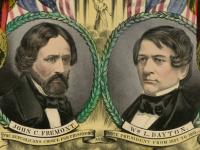Answer: Philadelphia's Musical Fund Hall
The Musical Fund Society of Philadelphia was established in 1820 based on the Boston model. The focus of the Society was to promote musical performance and aid musicians in need. The Musical Fund Society purchased the Fifth Presbyterian Church on Locust Street in 1824. Society member and architect William Strickland designed alterations and the Musical Fund Hall opened in December of that year. Musicians from around the world performed at the Musical Fund Hall including pianist Louis Gottschalk and Jenny Lind, “the Swedish Nightingale.”
The first Republican Convention was held at Philadelphia’s Musical Fund Hall in June of 1856. The party had been formed in 1854 opposing slavery, especially in the western territories. Abraham Lincoln was proposed as a vice-presidential candidate; however, the Republican Party nominated William L. Dayton for vice-president and John C. Fremont for president. The Republican campaign had various slogans; one of them was "Free Speech, Free Press, Free Men, Free Labor, Free Territory, and Fremont.” The Fremont-Dayton ticket was defeated in the 1856 election by Democrats James Buchanan and John C. Breckinridge.
The Musical Fund Hall went through additional alterations by Napoleon LeBrun, Addison Hutton, and others. Over the years the building was used for social and athletic events, rented to a boxing promoter, a cigar company, and today the building (now 810 Locust Street) is condominiums. The Society is still active with a focus on supporting the careers of emerging artists and maintains a membership of amateur and professional musicians.
HSP holds published proceedings of the first Republican National Convention and many subsequent conventions. We also hold materials related to the Musical Fund Society and other events held at the Musical Fund Hall.
Image: “Grand National Republican Banner,” lithographed and published by N. Currier (1856)

